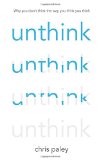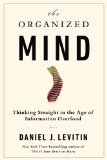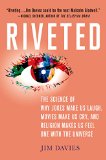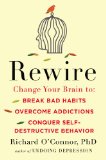August 23, 2014

Unthink: And How to Harness the Power of Your Unconscious by Chris Paley (Coronet Books, 2014)
(kindle ed.), (amazon.co.uk), (UK kindle ed.)
Book description from the publisher:
Your life is dominated by your unconscious mind: by thoughts you’re unaware of and movements you don’t realise you are making. Words, colours, mannerisms and other cues you don’t realise are affecting you, change what you think. The confidence you have in your ability to reason and to consciously choose what to do is caused by a series of illusions that scientists are only just beginning to understand. The discovery of these illusions will change the way we see ourselves more than the discoveries of Darwin and Copernicus. Unthink explores the unconscious decisions we make, and covers a variety of topics, ranging from how we choose politicians and romantic partners to more abstract subjects such as whether we can consciously decide to move our fingers. The counter-intuitive observations that Chris makes in the book include: * If you want someone to fancy you, wear red and meet them somewhere frightening. * When waitresses repeat customers’ orders back to them instead of just saying ‘yes’ they receive bigger tips. * To reduce your shopping bill, start at the beer and snacks end of the store and work backwards. * If you sit someone in an upright chair when you give them good news they will be prouder of their achievements. * Having a picture of your family on your desk might make you work harder, but you’ll be rattier when you get home! Chris Paley shows us how we can understand ourselves and others better, by having a greater understanding of the way that the unconscious mind has an impact of the way we live our lives.
See also: Author’s website
Comments (0)
- new books,psychology,Uncategorized
August 19, 2014

The Organized Mind: Thinking Straight in the Age of Information Overload by Daniel J. Levitin (Dutton, 2014)
(kindle ed.), (amazon.co.uk), (UK kindle ed.)
Book description from the publisher:
New York Times bestselling author and neuroscientist Daniel J. Levitin shifts his keen insights from your brain on music to your brain in a sea of details.
The information age is drowning us with an unprecedented deluge of data. At the same time, we’re expected to make more—and faster—decisions about our lives than ever before. No wonder, then, that the average American reports frequently losing car keys or reading glasses, missing appointments, and feeling worn out by the effort required just to keep up.
But somehow some people become quite accomplished at managing information flow. In The Organized Mind, Daniel J. Levitin, PhD, uses the latest brain science to demonstrate how those people excel—and how readers can use their methods to regain a sense of mastery over the way they organize their homes, workplaces, and time.
With lively, entertaining chapters on everything from the kitchen junk drawer to health care to executive office workflow, Levitin reveals how new research into the cognitive neuroscience of attention and memory can be applied to the challenges of our daily lives. This Is Your Brain on Music showed how to better play and appreciate music through an understanding of how the brain works. The Organized Mind shows how to navigate the churning flood of information in the twenty-first century with the same neuroscientific perspective.
Google Books preview:
See also:
Author’s website
Comments (0)
- new books,psychology
August 13, 2014

Riveted: The Science of Why Jokes Make Us Laugh, Movies Make Us Cry, and Religion Makes Us Feel One with the Universe by Jim Davies (Palgrave MacMillan, 2014)
(kindle ed.), (amazon.co.uk), (UK kindle ed.)
Book description from the publisher:
Why do some things pass under the radar of our attention, but other things capture our interest? Why do some religions catch on and others fade away? What makes a story, a movie, or a book riveting? Why do some people keep watching the news even though it makes them anxious?
The past 20 years have seen a remarkable flourishing of scientific research into exactly these kinds of questions. Professor Jim Davies’ fascinating and highly accessible book, Riveted, reveals the evolutionary underpinnings of why we find things compelling, from art to religion and from sports to superstition. Compelling things fit our minds like keys in the ignition, turning us on and keeping us running, and yet we are often unaware of what makes these “keys” fit. What we like and don’t like is almost always determined by subconscious forces, and when we try to consciously predict our own preferences we’re often wrong. In one study of speed dating, people were asked what kinds of partners they found attractive. When the results came back, the participants’ answers before the exercise had no correlation with who they actually found attractive in person! We are beginning to understand just how much the brain makes our decisions for us: we are rewarded with a rush of pleasure when we detect patterns, as the brain thinks we’ve discovered something significant; the mind urges us to linger on the news channel or rubberneck an accident in case it might pick up important survival information; it even pushes us to pick up People magazine in order to find out about changes in the social structure.
Drawing on work from philosophy, anthropology, religious studies, psychology, economics, computer science, and biology, Davies offers a comprehensive explanation to show that in spite of the differences between the many things that we find compelling, they have similar effects on our minds and brains.
Google Books preview:
See also: Author website
Comments (0)
- new books,psychology
July 31, 2014

Rewire: Change Your Brain to Break Bad Habits, Overcome Addictions, Conquer Self-Destructive Behavior by Richard O’Connor (Hudson Street Press, 2014)
(kindle ed.), (amazon.co.uk)
Book description from the publisher:
We humans tend to get in our own way time and time again—whether it comes to not speaking up for ourselves, going back to bad romantic partners, dieting for the umpteenth try, or acting on any of a range of bad habits we just can’t seem to shake. In Rewire, renowned psychotherapist Richard O’Connor, PhD, reveals exactly why our bad habits die so hard. We have two brains—one a thoughtful, conscious, deliberative self, and the other an automatic self that makes most of our decisions without our attention. Using new research and knowledge about how the brain works, the book clears a path to lasting, effective change for behaviors that include:
- Procrastination
- Overeating
- Chronic disorganization
- Staying in bad situations
- Excessive worrying
- Risk taking
- Passive aggression
- Self-medication
Bringing together many different fields in psychology and brain science, Dr. O’Connor gives you a road map to overcoming whatever self-destructive habits are plaguing you, with exercises throughout the book. We can rewire our brains to develop healthier circuitry, training the automatic self to make wiser decisions without having to think about it; ignore distractions; withstand temptations; see ourselves and the world more clearly; and interrupt our reflexive responses before they get us in trouble. Meanwhile, our conscious minds will be freed to view ourselves with compassion at the same time as we practice self-discipline. By learning valuable skills and habits—including mindfulness, self-control, confronting fear, and freeing yourself from mindless guilt—we can open ourselves to vastly more successful, productive, and happy lives. The book even demystifies how to overcome what Dr. O’Connor calls the “undertow” (the mysterious force that sabotages our best efforts when we’re just on the edge of victory) for long-lasting change. Offering a valuable science-based new paradigm for rewiring our brains, Rewire is a refreshing guide to becoming a healthier, happier self.
Google Books preview:
Comments (1)
- new books,psychology
July 9, 2014

Suspicious Minds: How Culture Shapes Madnessby Joel Gold and Ian Gold (Free Press, 2014)
(kindle ed.), (amazon.co.uk)
Book description from the publisher:
Combining extraordinary true stories with the latest research, Joel and Ian Gold take us on a wild journey through the delusional brain to explore the intersection of neuroscience, biology, and culture.
Mr. A. was admitted to Dr. Joel Gold’s inpatient unit at Bellevue Hospital in 2002. He was, he said, being filmed constantly, and his life was being broadcast around the world “like The Truman Show”—the 1998 film depicting a man who is unknowingly living out his life as the star of a popular soap opera. Over the next few years, Gold saw a number of patients suffering from what he and his brother, Dr. Ian Gold, began calling the “Truman Show Delusion,” launching them on a quest to understand the nature of this particular phenomenon, of delusions more generally, and the nature of madness itself.
The current view of delusions is that they are the result of biology gone awry, of neurons in the brain misfiring. In contrast, the Golds argue, delusions are in fact the result of the interaction between the brain and the social world. By exploring the major categories of delusion via fascinating case studies and marshaling the latest research in schizophrenia, the brothers reveal the role of culture and the social world in the development of psychosis, notably delusions. The result is a groundbreaking new direction for thinking about the interaction of the brain and the world around us.
Sure to appeal to those who admire the work of Oliver Sacks, Steven Pinker, and Antonio Damasio, Suspicious Minds presents a fascinating study about just how dramatically our surroundings can influence our brains.
Google Books preview:
Comments (0)
- culture,new books,psychology







